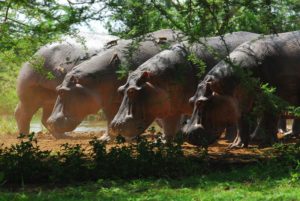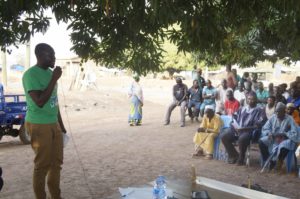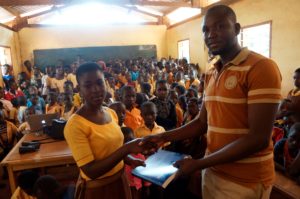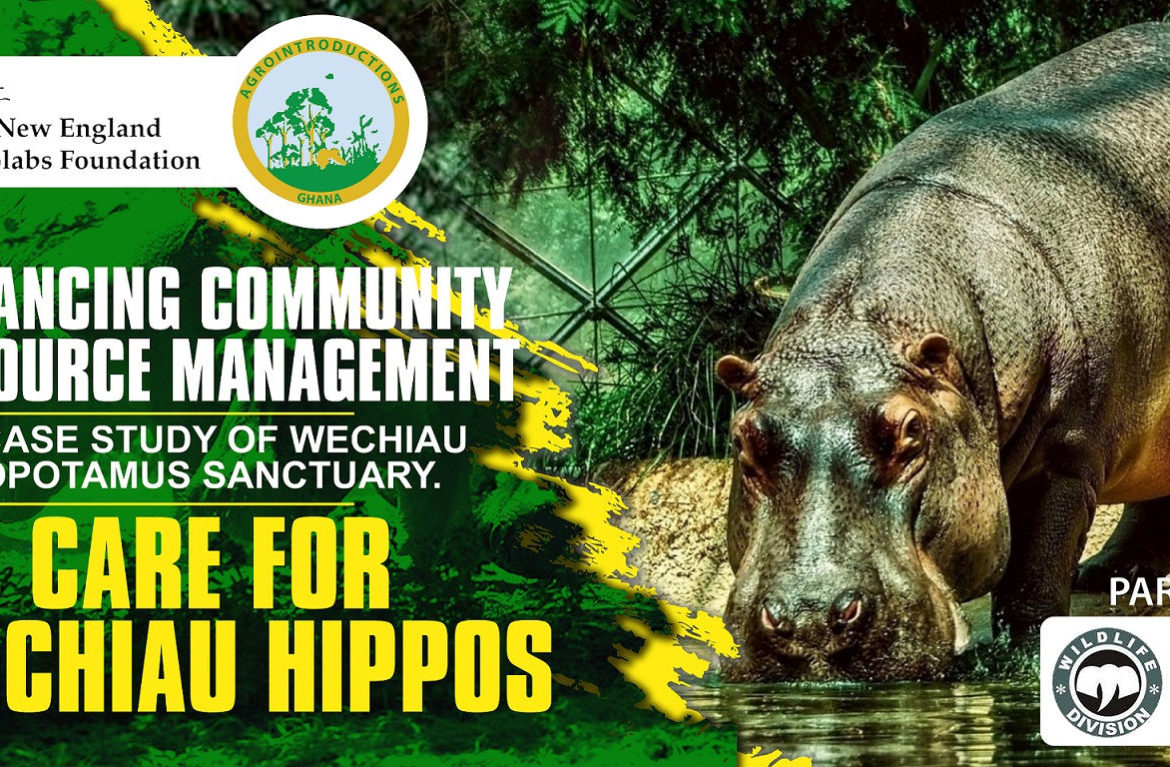In the past 50 years, humans have changed ecosystems more rapidly to meet growing demands for food, fresh water, timber, fibre and fuel. This has resulted in substantial decrease in biodiversity, including the hippopotamus (hippo) population. There are currently about 150,000 hippos left in the world. Their status will change from vulnerable to endangered if threats are not controlled. The threats include destructive exploration and exploitation for human survival through hunting for ivory and meat, habitat loss due to flooding and destruction of hippo lawns along riverbanks. Sustainable exploration of biodiversity, on the other hand, ensures a balance in nature through synergistic cooperation in ecosystem services, human well-being as well as the direct and indirect drivers of change.

Ghana has two hippo populations; one at Bui National Park and the other at the Wechiau Community Hippo Sanctuary (WCHS) established in 1998. The WCHS is home to several other species. It has more than 150 bird species and countless animals ranging from baboons and hedgehogs to chameleons and pythons. It is also home to the local Wala and Lobi people, both of whom have an intriguing culture and way of life. A vast majority of the population is traditionally oriented thus revere traditional beliefs and customs.
The chiefs and people employ the use of local regulations, customs, folklore and traditional bye-laws (taboos) to protect the hippos from poaching and hunting. The hippos have become a part of their identity and cultural heritage and thus revered as special animals. It is also believed that the hippopotamus has a spiritual significance for the growth and prosperity of the indigenes.
The communities also believe the deities or gods provide refuge to the hippopotamus and other rare species occurring in the area. It is, therefore, a strong taboo for any person to hunt or kill a hippopotamus. There exists strong interlinks between traditional cultural believes and wildlife. Libations and other traditional ceremonies are held annually by traditional priests/priestess for the protection and proliferation of the hippopotamus species.
Agroin troductions Ghana with the funding support of New England Biolabs Foundation (NEBF), conservation partners and local authorities of Wechiau community area launched a project titled: “Enhancing Community Resource Management: The case of Wechiau Hippo Sanctuary”. This project aims at enforcing and strengthening community-based management and conservation of the Wechiau Sanctuary through local capacity development, bio-monitoring research, grass root conservation education and participatory resource management.
troductions Ghana with the funding support of New England Biolabs Foundation (NEBF), conservation partners and local authorities of Wechiau community area launched a project titled: “Enhancing Community Resource Management: The case of Wechiau Hippo Sanctuary”. This project aims at enforcing and strengthening community-based management and conservation of the Wechiau Sanctuary through local capacity development, bio-monitoring research, grass root conservation education and participatory resource management.
So far, this timely project intervention has contributed to raising the knowledge and technical capacity of site managers, local leaders and volunteers for effective management of the sanctuary. For instance, through the support of the Ghana Wildlife Division, we have trained a total of ten (10) local sanctuary managers and youth volunteers in simple bio-monitoring survey protocols.
In the instance of the schools behavior change education program, key activities such as community resources and hippo conservation videos were shown to educate the children, quizzes, local conservation drama activities, poetry recital, setting-up of school environmental club, and site seeing trips to the sanctuary were organized to steer up their desire for conservation.
Also, communities have been engaged and educated on sustainable sanctuary uses climate-smart agriculture and agroforestry practices, which are currently being adopted by fringed communities for farming. Fuel-wood harvesters and charcoal burners have also been identified and educated on the wise use of the forest, alternative livelihood and ecological friendly economic activities.
Much effort has been committed to promoting economically viable activities in the area such as ecotourism, marketing of rich culture, and craft works. This is evident by the increase in revenue that accrued to the WCHS. It also generated peaceful cohesion and aesthetics of the environment and development of property rights.
Our project demonstrates that biodiversity management founded on good communal relationships cannot only improve the livelihoods of the rural poor but also increase their resilience to face challenges as the people become more economically and socially resilient, and empowered to handle future threats to ecological imbalances.

It is hoped that continuation of the project would increase the knowledge, skills and technical proficiency of the beneficiary communities to effectively and efficiently manage the community resource. This will help to raise public awareness on the hippo conservation and promote creative and participatory management style among the locals for the sustainable perpetuity of the sanctuary.
Going forward, AIG and local stakeholders hope to leverage further funding and support from grantees and/or partners to upscale and extend the ripples of the project to other critical conservation and bio-cultural sensitive areas that are threatened within the project area.
Since the project area is climate sensitive with high levels of poverty, we intend to introduce and intensify an ecologically friendly agricultural technology, known as conservation agriculture for both subsistence and small-scale farming with technical guidance with the support of Ministry of Food and Agriculture Organization (MOFA).
In the long term, the sustained project would yield an effectively managed sanctuary with optimum protection and conservation of wildlife and cultural diversity whilst solidifying their economic power, community integration and unison for better societies.
Acknowledgement of partners
We would like to thank all our local and international partners especially the New England Biolabs Foundation (NEBF) for providing resources and technical support for our project.
We are also very much indebted to the Traditional Authorities, Ghana Wildlife Division, GEF UNDP, and HATOF Foundation for the continuous in-kind and technical support for our projects.
We extend our gratitude to all the programs managers, community members, community school management and youth clubs, and all volunteers involved directly and indirectly in our operations.
Finally, we are thankful to all the staffs of AiG for their hard-work and commitment to accomplish our project goals.

